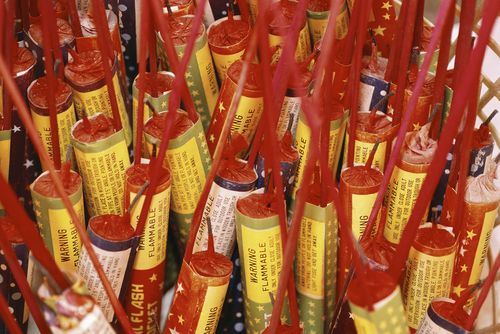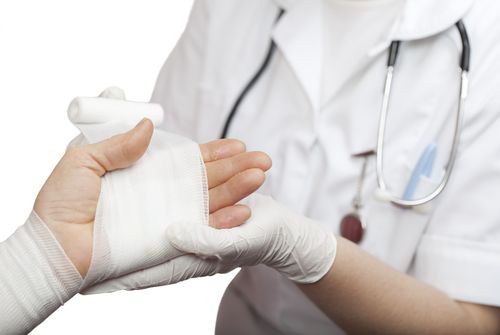Fireworks are as much a part of our Fourth of July celebrations as grilled hamburgers and parades. Although fireworks are a fun and festive way to celebrate our independence, the fun can come to a startling end with a firework accident. The same fireworks that we rely on for fun were responsible for more than 11,000 injuries severe enough to require emergency room visits in 2016. On average, fireworks cause more than seven deaths annually. These statistics show the importance of making safety a regular part of the celebration.
Every year, fireworks tents seem to pop-up earlier and earlier. People buy more and celebrate longer than ever before. People purchase the products with confidence, assuming they will work flawlessly. Sometimes accidents occur when the user doesn’t follow the directions and safety tips. In other cases, it’s a matter of product defect. When the manufacturer doesn’t follow strict manufacturing processes, the fireworks don’t always perform as expected. When a defective product results in a firework accident, you have the right to pursue legal compensation.

From Poppers and Sparklers to High-Level Fireworks Shows
Fireworks classification depends on size, powder content, and chemical restrictions. Each state has laws pertaining to which classifications of fireworks are permitted for sale and for what use.
Some items like poppers and snappers or throw-downs are classified as “Toy Trick Noisemakers.” These items aren’t classified as fireworks and, as such, are sold pretty much anywhere in the country. They lack a fuse and you activate them by throwing them onto a hard surface. Smoke toy devices designed to create smoke without noise also fit into the “toy” category. Generally, these are considered safe for older kids to use but adult supervision is still advised.
Sparklers are not the child-friendly firework that most people think. Yes, we see them on top of birthday cakes and in the hands of children who are barely old enough to walk. But the Consumer Product Safety Commission (CPSC) reported in 2014 that sparklers caused nearly 20% of all fireworks-related injuries. So, why are these entertaining little fire sticks such a hazard?
For starters, unlike ‘toy’ fireworks, sparklers must ignite to work. While burning, they reach temperatures of up to 3,000°F, depending on the fuel and oxidizer used to manufacture them. Not only is that hot enough to burn skin, but also to catch flammable clothing on fire. There’s also the sparks that fly away from the body of the sparkler, which are bits of burning powdered metal. The high temperature of these sparks means kids don’t have to be careless to get serious burns to their skin or eyes.
Tips for Making Sparklers Safer
CPSC recommends limiting sparklers to kids aged 7 years and older and only in open areas. Also, keep children apart (at least 10 feet) to prevent them from burning one another. A good tip to prevent kids from burning their hands is to cut a hole in the bottom of a plastic cup and stick the sparkler through it. Fit the cup over the child’s hand so the cup forms a barrier between the sparkler and their hand. Finally, consider new bamboo sparklers that don’t get as hot or retain their heat after they burn out.
Bottle Rockets and Roman Candles: More Dangers for Kids
Bottle rockets are small fireworks with a fuse on a long, thin stick. You place the stick into a container, often an empty soda bottle, to stabilize it. Once you light the fuse, the bottle rocket shoots out and travels through the air like a rocket.
Bottle injuries are usually to the eyes. They can cause severe, lifelong injuries including partial and total vision loss. While fireworks of any type have the potential to cause eye injuries, bottle rockets are believed to be the biggest threat to young children. Many parents think of the small fireworks as safe and fail to supervise children while using them.
Tips for Making Bottle Rockets Safer
To use bottle rockets safely, kids need to have on eye protection. It’s also important to take precautions to protect bystanders as well as the ones lighting the fuse. Many injuries occur during festivities where people are observing the fireworks or who don’t even realize they are nearby. Bottle rockets are recommended for older teens under (sober) adult supervision.
Another popular choice for young fireworks enthusiasts is Roman candles. The long, cylindrical tube holds a number of charges, which fire one after the other. The average Roman candle shoots about 50 to 80 feet while larger ones travel much further. Bottle rockets accounted for more than 40% of the total firework injuries in 2014. Most of these injuries occurred to children aged five and younger.
Adults often think of these fireworks as appropriate for small kids because they can hold them in their hands and just point to fire. While there is a danger of pointing the fireworks towards another person, the biggest risk comes from them exploding in your hand. Sometimes the final shot doesn’t go off as planned and the remaining chemicals blow up.
Damage from a roman candle varies from lacerations, tendon and muscle damage, to loss of fingers or amputations of the hand. Severe injuries result in high medical bills and potential lifelong disabilities. Pain and suffering can also be significant. If the firework accident happens because of a product defect, you need a personal injury attorney to explain your rights. If the accident is the result of another person or group’s negligence, you may still have a personal injury case. You shouldn’t suffer the consequences of another person’s or a company’s negligent actions.
Tips for Making Roman Candles Safer
Like the other seemingly harmless fireworks, only older teens and adults should use Roman candles. No one should ever hold them in their hand. Make sure there is adequate space to prevent contact with people close by.

Myths about Fireworks
One of the main reasons that people tend to use fireworks incorrectly is that they don’t believe the danger is real. Many people who raced to the emergency room for the first time had used fireworks without injury many times before. But it only takes one firework accident to do serious damage or kill someone.
Many families and other groups use fireworks as part of their 4th of July celebrations. Don’t buy into the myths of fireworks use. If you plan to have fireworks of any kind at your event, keep the following general safety tips in mind.
- Set up a designated area away from the crowd and put on a show for their entertainment. Let the older teens and adults take care of igniting.
- Let the little ones enjoy the show from afar. Encourage them to applaud the performance of the older ones doing the lighting.
- Never let young kids light any fireworks that have a fuse. Period.
- Keep alcohol and fireworks separate.
- Follow the directions on the side of the fireworks. People often think the cautions written there are to protect the company from liability. But there is a real potential for injury.
- Douse used fireworks with water to ensure they aren’t still burning. Don’t throw them into the trash.
- Supply long-length lighters or lighting sticks to provide distance between the person and the fuse. Sometimes the firework ignites faster than expected.
- Never use fireworks indoors or carry them in your pocket.
- Never handle ‘duds’ with the assumption they aren’t burning. Never try to reignite used fireworks or those that don’t work. Douse them with water like you do the used ones and then dispose of them.
- Keep your distance. Treat fireworks like a loaded gun. Don’t point at yourself or anyone else and don’t lean over them.
- Place fireworks on a flat, level surface before igniting to prevent them from falling over during activation.
The Risk of a Firework Accident at a Fireworks Show
More people get injured from fireworks they buy and use at home than those used at large-scale fireworks shows. Even so, those involving a higher class of fireworks often injure many people at one time.
Businesses sometimes put on a professional fireworks show for their customers. State or county organizations may put on shows too. A licensed pyrotechnician is required to put on these high-level shows. Between the cost of high-level fireworks and a qualified crew, these businesses spend several thousand dollars on these shows. That cost can dim in comparison to the amount of liability they could incur from a firework accident.
Determining liability for these firework-related injuries may be challenging. The manufacturer may be liable for malfunctioning fireworks or those that do not include appropriate warnings. The firework may be poorly made or have a unique chemistry that makes them riskier to handle.
When a state or county hires the crew to put on the fireworks show, the pyrotechnic company may be liable. If they mishandled the fireworks or failed to take current weather conditions into account, their negligence can result in a serious firework accident.
In states where there is a shared negligence law, it’s possible for the victim to share the blame. For example, failing to observe safety barriers could have contributed to putting you in harm’s way. It’s in your best interest to visit a personal injury attorney familiar with the laws in your state.

What to Do When Someone Has a Firework Injury
The best cure for fireworks injuries is prevention. When they do occur, getting immediate medical treatment will help minimize the results.
Burns
Hold the area under cool water for a minimum of 10 minutes. Apply a coating product like Second Skin for protection. If none is available, use plastic wrap. Do not use first aid cream or bandages on severe or large burn areas. For minor burns, apply gel or cream containing Aloe Vera. Any burn larger than the person’s hand requires emergency treatment.
For large, severe burns that occur from clothing catching on fire, call 911 immediately. Remove clothing and jewelry from the area unless they are stuck to the wound.
Amputation
Sometimes exploding fireworks cost people their fingers or toes. Always call 911 immediately. Lay the person down and keep the injured area elevated. Remove any visible pieces of the fireworks. Apply direct pressure to the wound until the bleeding stops or help arrives and tells you to stop.
If the missing appendage is whole, rinse it and wrap in a clean, damp cloth. Send it to the hospital with the victim for potential reattachment. Do not place the appendage on ice, which causes damage to the blood vessels.
Shock
Receiving major injuries can cause a person to go into shock. Check to see if their skin is cool or clammy. Symptoms also include confusion, a weak or uneven pulse, and dilated pupils. If they aren’t lying down, have them do so. Keep their feet elevated higher than their head. Cover them with a blanket to keep them warm.
If the person is bleeding from the mouth due to the injury or they begin vomiting, turn them on their side to keep their airway clear.
Eye Injury
Eye injuries from fireworks range from minor irritation to punctures. Treat only the most minor eye injuries at home. Use clean water or sterile saline solution to flush the eye. Look under a strong light to ensure all of the particles are flushed out. Always seek immediate medical treatment if a part of the firework penetrates the eye. Never try to pull out penetrating objects.
Even if there is no obvious sign of damage, get immediate treatment if the person experiences impairment of vision. Chemicals and minute particles can cause damage that isn’t visible.
A Word About Fire Prevention
Sometimes lighting fireworks or the fireworks themselves cause people’s clothes to catch fire. This can result in severe burns over a large portion of their body. Fireworks are also responsible for more than 18,000 fires of structures, vehicles, greenery, and other materials annually. In addition to the injuries and deaths, fires also caused an average of $43 million in property damage.
Fireworks are a lot of fun but they come with a huge responsibility. Following a few simple safety tips can go a long way towards preventing firework accidents that result in serious injuries.
When you or someone close to you gets injured, contact Batta Fulkerson. We are an experienced personal injury firm devoted to getting the best resolution for you.




